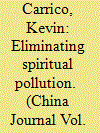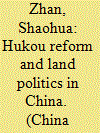|
|
|
Sort Order |
|
|
|
Items / Page
|
|
|
|
|
|
|
| Srl | Item |
| 1 |
ID:
153539


|
|
|
|
|
| Summary/Abstract |
This article explores the problem of cognitive delays among toddlers in rural China and the role of their caregivers in producing low levels of cognition (i.e., low IQ). According to the results of a well-tested international scale of child development, the Bayley Scales of Infant Development (BSID), cognitive delays are alarmingly common, and nearly half the toddlers in our sample score an IQ of less than 84 on the BSID test (more than one standard deviation below the mean). In analyzing the source of this, we find that poor parenting—for example, not reading to, singing with, or engaging in stimulating play with one’s children—is closely associated with these delays. Even though mothers (as opposed to grandmother caregivers), and especially more educated mothers, are more likely to follow good parenting practices, quality parenting is rare overall. We seek to find out why so many young children appear to be neglected when it comes to modern parenting practices. We empirically rule out the hypotheses that caregivers discriminate according to their child’s gender; that the number of children in a given household is associated with the quality of parenting; or that caregivers living in relative poverty parent differently than their wealthier counterparts. According to the qualitative component of our study, we also find that inadequate parenting does not stem from parental indifference. Parents and grandparents obviously love their children and want them to succeed in life. Instead, the barriers appear to be primarily a lack of time and an absence of knowledge about the importance of good parenting practices. As a result, when they grow up, these children may not possess the levels of cognition needed to thrive in China’s increasingly high-skill-based economy. Overall, our findings suggest that China may be facing a national crisis due to inadequate rural early childhood development.
|
|
|
|
|
|
|
|
|
|
|
|
|
|
|
|
| 2 |
ID:
153541


|
|
|
|
|
| Summary/Abstract |
Most histories have analyzed China’s 1983 Campaign to Eliminate Spiritual Pollution through the lens of elite politics. This article proposes a new interpretation of “spiritual pollution,” drawing upon anthropological theories of taboo and pollution to reinterpret the campaign’s role in reform-era culture and identity construction. The early reform era was a time of collapsing social borders that erased the obsessively delineated identities of the previous decades. Within this context, I reinterpret the struggle against spiritual pollution as an attempt to employ taboos to reinstate schematic boundaries in a world suddenly in flux. This process of post-Maoist boundary building particularly focused upon the distinction between “East” and “West,” as well as the distinction between the economic and political realms. The results of the campaign can still be seen today: the construction of a pure official identity based in overcoming Mao-era economic taboos alongside the perpetuation of political and cultural taboos.
|
|
|
|
|
|
|
|
|
|
|
|
|
|
|
|
| 3 |
ID:
153540


|
|
|
|
|
| Summary/Abstract |
During four decades of economic reforms, research universities have become China’s new national symbol of intellectual prowess. The government has been strategizing and pouring in resources to strengthen their global competitiveness. Despite expanded opportunities, universities have continued to operate within the confines of a tight regulatory regime. Based on interviews with university leaders and executives, this article focuses on China’s first-of-its-kind university advocacy coalition known as “C9” and investigates how the leading Chinese research universities align their interests and act collectively vis-à-vis the central state to influence policies of crucial importance to their operations. It sheds light on how collective lobbying works in the university sector and on its limitations in the Chinese political context and examines the key factors that shape the interactions among universities, the outcomes of collective lobbying, and the political implications.
|
|
|
|
|
|
|
|
|
|
|
|
|
|
|
|
| 4 |
ID:
153537


|
|
|
|
|
| Summary/Abstract |
Since the 1990s, agricultural cooperatives—particularly what China calls Farmers’ Specialized Cooperatives—have experienced rapid expansion in China. After more than two decades of growth and policy support, what is the overall performance of the ever-increasing numbers of these cooperatives? We visited 50 cooperatives across the country, most of which had officially been lauded as successful, to make a first-hand evaluation of their overall status and performance. We argue that, judging by either international or Chinese standards, the vast majority of these agricultural cooperatives are not authentic and fail to deliver expected benefits to smallholders. We categorize them into five types: genuine cooperatives, shell cooperatives, de facto private agribusinesses, decooperativized cooperatives, and failed cooperatives. Four barriers impede the long-term prospects of authentic cooperatives: social differentiation, lack of trust, unpredictable markets, and poor policy design and implementation.
|
|
|
|
|
|
|
|
|
|
|
|
|
|
|
|
| 5 |
ID:
153538


|
|
|
|
|
| Summary/Abstract |
This article calls attention to the role of capital, large capital in particular, in recent reforms to China’s system of household registration (hukou). It argues that a tripartite alliance between agrarian capital, urban capital, and local governments arose in the first decade of this century and has become a major force driving locally initiated hukou reforms. The main goal of reform has been to facilitate the transfer of land rights from rural residents so that rural land could be used to generate profits and government revenue. While rural residents are compensated for the loss of land rights, many face increasing insecurity in their livelihoods. The article is based on an extensive survey of local policy documents and a case study of Chengdu Municipality in Sichuan Province.
|
|
|
|
|
|
|
|
|
|
|
|
|
|
|
|
|
|
|
|
|